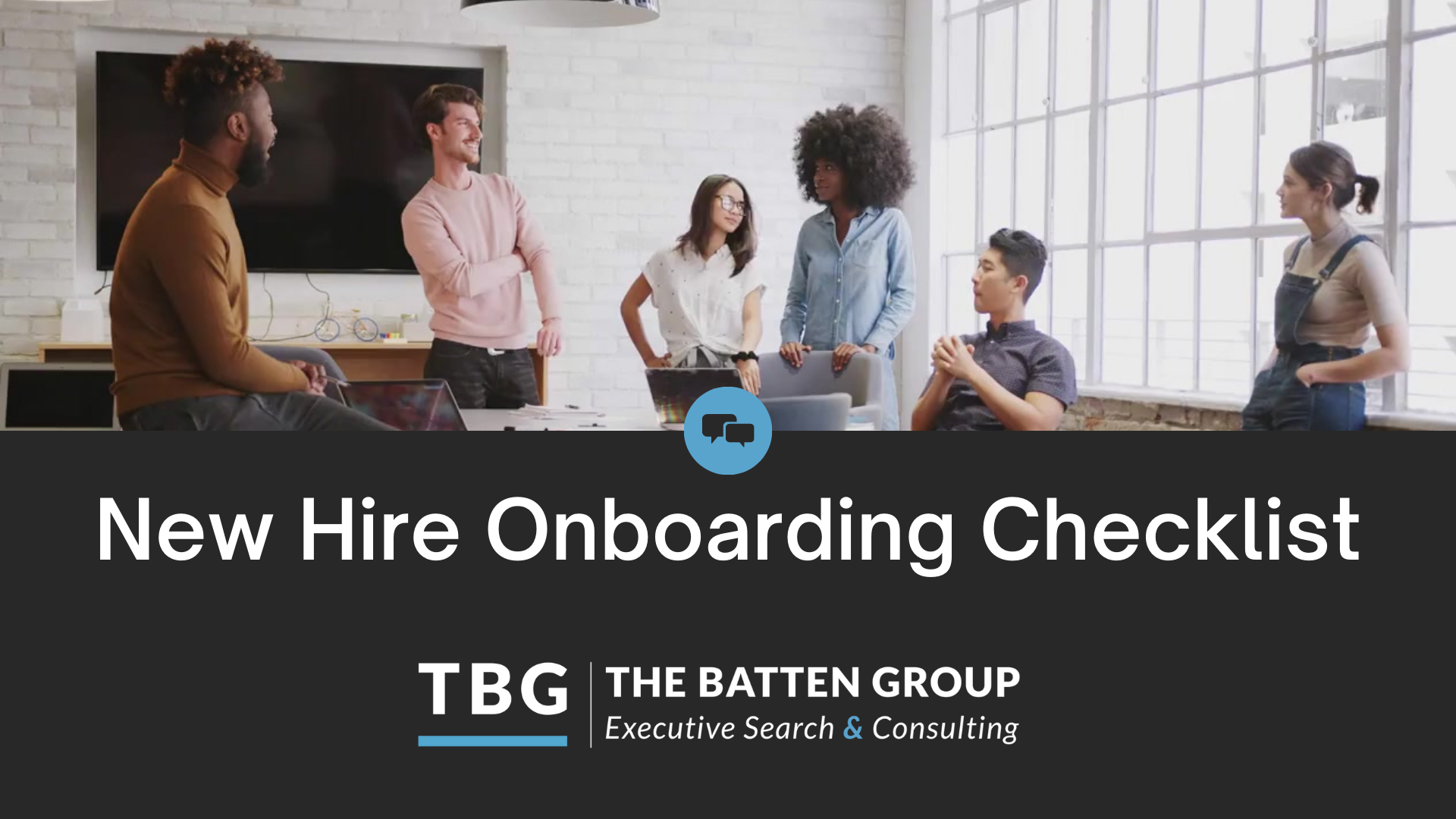An onboarding process is vital to help new employees become productive and engaged team members. A well-designed onboarding checklist can ensure that all the necessary steps are taken to welcome, train, and support new hires, whether they work in the office or remotely.
Far more than a “new hire orientation” where new employees are briefed on benefits and sent on their way, an onboarding program is a comprehensive way to get new hires fully immersed and ready to hit the ground running. The process includes simple tasks, but – more importantly – it involves showing your new team member the big picture to expedite a broad understanding of high-level strategies, current projects, and company culture and share your mission. It also jumpstarts familiarity with the people they will be interacting with.
To set the tone for a high level of engagement, it’s critical to get the onboarding process just right. Every step should be met with easygoing, pleasant confidence by everyone on the team. To pull this off, you have to be buttoned up and prepared – which is often incredibly challenging when you’re just coming off weeks – or months-long interview process that likely interfered with your productivity.
That’s why a checklist is vital. This list will help get you thinking of everything you should do to facilitate the kind of onboarding that will serve to let your new hire hit the ground running while fostering relationships along the way. It’s also a bit of a self-fulfilling prophecy: employees who were onboarded well will pay it forward and do the same for their future hires because they know how well they were set up – and how great it felt. Your company will also build an excellent reputation for employee engagement, which is never wrong.
Employees who were properly onboarded also have a much higher likelihood of staying, which keeps your recruiting costs low and seamless productivity high.
Keep reading for tips on creating an onboarding checklist for your organization.
DEFINE YOUR ONBOARDING GOALS & TIMELINE
Having clear and measurable goals and a realistic timeline can help you design an effective onboarding program that aligns with your organizational culture and values.
- What do you want your new employees to learn, achieve and feel during their first days, weeks, and months?
- How long will the onboarding process last?
- What are the key milestones and checkpoints along the way?
ASSIGN ROLES & RESPONSIBILITIES
Assigning a dedicated onboarding team, including a manager, a mentor, a buddy, and an HR representative, can help you provide consistent and personalized guidance and support to your new employee.
- Who will be involved in the onboarding process?
- What are their roles and responsibilities?
- How will they communicate and collaborate with each other and with the new hire?
PREPARE THE NECESSARY PAPERWORK AND EQUIPMENT
- Before the new hire starts, ensure they have completed all the required forms and documents, such as tax forms, contracts, policies, and handbooks.
- You can use online tools to streamline and automate this process.
- Also, make sure they have all the equipment and tools they need to perform their job, such as laptops, phones, software, and access codes. If they work remotely, ship these items to their home address in advance.
PLAN A WARM WELCOME
The first day of a new job can be both exciting and nerve-wracking for new employees.
- Make them feel welcome and valued by sending them a welcome email or video introducing them to their team and other colleagues.
- Give them a tour of the office or a virtual tour of the online platforms you use.
- Invite them to a welcome lunch or a virtual coffee break.
- You can also send them a welcome package with some branded swag or a gift card.
PROVIDE TRAINING AND FEEDBACK
Training is a crucial part of onboarding, as it helps new employees learn the skills and knowledge they need to perform their roles effectively.
- Use a variety of methods to deliver training, such as online courses, webinars, videos, manuals, quizzes, simulations, or shadowing.
- Make sure to tailor the training content and pace to the needs and preferences of each new hire.
- Provide regular feedback and coaching to help them improve and grow.
SET EXPECTATIONS AND GOALS
One of the main objectives of onboarding is to help new employees understand what is expected of them and how they will be evaluated.
- Set clear and SMART (specific, measurable, achievable, relevant, and time-bound) goals for their first 30, 60, and 90 days, as well as longer-term objectives.
- Review their job description, key performance indicators (KPIs), reporting structure, and career path.
ENGAGE THEM IN YOUR CULTURE
Onboarding is not only about teaching new employees how to do their job but also how to fit in your organization.
- Help them learn about your mission, vision, values, norms, traditions, and stories by sharing your organization’s culture.
- Invite them to join social events or clubs.
- Encourage them to participate in volunteer or wellness activities.
- Ask them to share their own background and interests.
SOLICIT FEEDBACK AND MEASURE RESULTS
The last step of creating an onboarding checklist is evaluating its effectiveness and identifying improvement areas.
- Solicit feedback through surveys, interviews, or focus groups.
- Measure the results of the onboarding program by tracking metrics such as retention rate, time to productivity, employee satisfaction, engagement level, or performance quality.
ABOUT THE BATTEN GROUP
The Batten Group is a premier national executive search and consultancy firm with over 75 years of collective experience in nonprofit, philanthropy, and talent evaluation and acquisition. We recruit exceptional candidates for nonprofit, healthcare, higher education, and mission-based organizations to build winning teams.
As experts in recruiting and talent acquisition, our goal is to connect exceptionally talented people with our mission-driven partners to help them achieve their most ambitious and strategic goals.
The Batten Group’s commitment to diversity, equality, and inclusion (DEI) is critical to our success and our partners’ success. We value and foster environments that reflect DEI.
We’d love to talk to you about your organization’s goals and recruiting needs! Contact us to discuss how we can help build a winning team for your organization to take it to the next level. Visit www.thebattengroup.com for more information, or click here for details on our hiring methodology.
Follow us on LinkedIn and Twitter to keep updated on all our latest job postings. Have you signed up for our monthly newsletter? All the news & information you need on nonprofit careers and job searching, as well as the newest job postings…click here to sign up.






